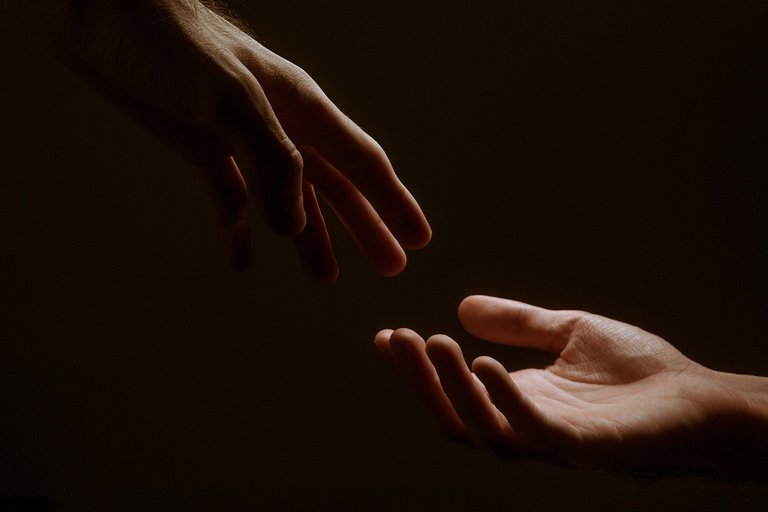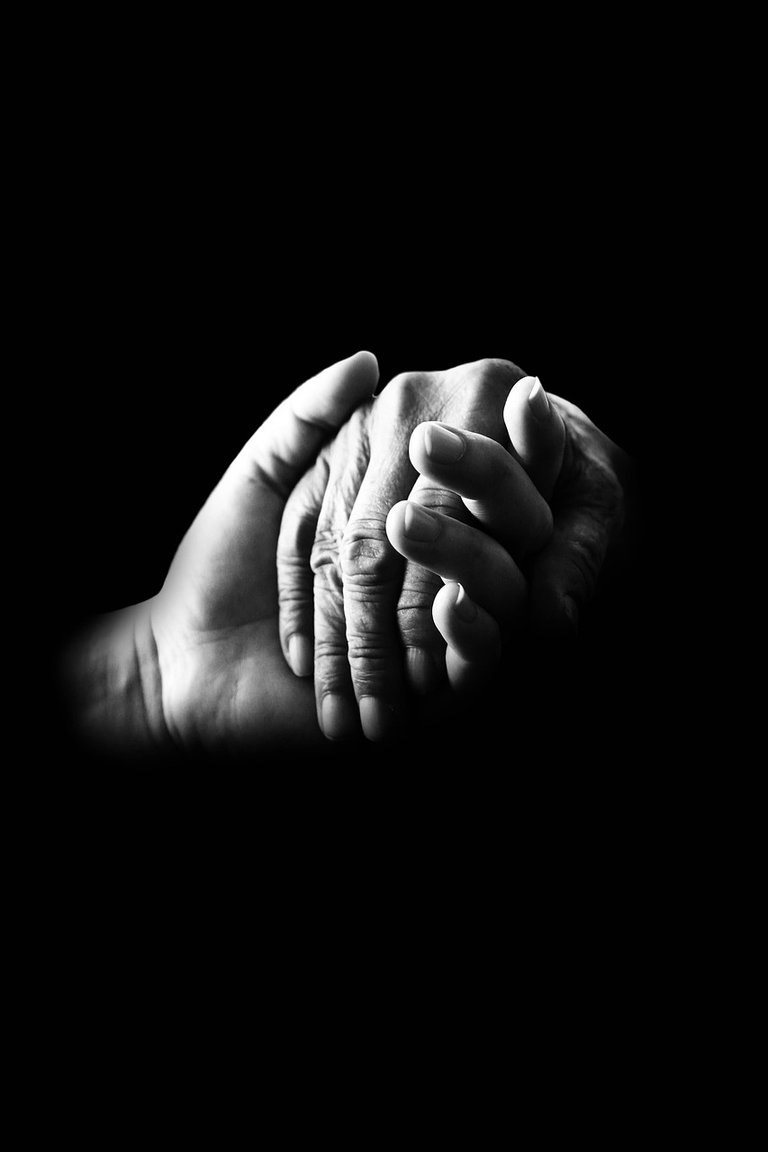
Hola amigas y amigos de Holos & Lotus. La iniciativa propuesta por el amigo @emiliorios hace días me trajo un tropel de recuerdos, gratos recuerdos y a la par me llevo a reflexionar sobre la vida vivida por uno de mis abuelos. Sobre la base de mi percepción respecto a su vida y como la vivió hasta el final intentaré responder a las preguntas planteadas en la iniciativa.
Parto diciéndote que este abuelo del que hablo vivió hasta los 91 años y estuvo casi hasta su último día bien activo, física y mentalmente. Digo activo y me refiero acorde a las características de su edad.
En eso pudo influir varios factores. Sus características de personalidad en primer lugar. En segundo creo que también el hecho de estar en varias ocasiones casi al borde de la muerte. Nunca le pregunté para confirmar mi hipótesis pero creo que eso también influyó en que valorará cada minuto de su tiempo hasta el final.
Verlo con su dinamismo influyó en que no me guste para nada ver a los adultos mayores sentados en un sillón, con la cabeza apoyada en una mano esperando que el tiempo pase. Soy consciente de que cada quien vive la vida en sus términos y hay que respetar eso. Sin embargo no puedo evitar sentirme mal cuando veo a alguien así.
Lo asocio con un estado de ánimo triste, aburrido, con perdida del sentido de la vida y la vejez es otra etapa que aunque pueda estar asociada a la normal perdida de algunas facultades, puede vivirse plenamente.
Por otro lado, soy consciente de la necesidad de aceptar la llegada de esa etapa y hacerlo de modo adecuado. Es inevitable que con ella vayan llegando enfermedades crónicas y eso influye en el comportamiento de las personas. Por tanto, aceptar ese hecho nos ayuda a cuidar mejor de nuestra salud.
Soy participe de que los adultos mayores tengan una vida activa pero al mismo tiempo creo que debe ajustarse sus verdaderas posibilidades. Lo digo porque en mi experiencia con mi abuelo, algunas veces entrabamos en conflicto debido a que lo yo le sorprendía realizando un esfuerzo físico no apto para el. A veces me daba la sensación de que creía tener 15 años.
Entonces, respondiendo a las preguntas de @emiliorios: ¿Cómo proponer que los adultos mayores a mi alrededor puedan aceptar y gestionar está nueva etapa, dando la valoración correcta a la misma?

Primero creo que debemos validar sus necesidades, mantenerlos el espacio que siempre han tenido en la familia. Es cierto que la vida moderna nos lleva a un ritmo acelerado y que a veces, para poder poner en la mesa lo que se necesita para vivir debemos invertir mucho tiempo y esfuerzo.
No obstante, creo que debemos medir sacrificios. Para mí significa un sacrificio no aprovechar la oportunidad de intercambiar afectos con nuestros adultos mayores, así como renunciar al conocimiento de sus experiencias de vida.
Te hablo en un sentido que puede parecer es en mi beneficio y es cierto. No obstante, el hecho de otorgarles un lugar en el que se sientan útiles (!porque lo son realmente¡) influye de modo positivo en su calidad de vida.
Entonces, una visión correcta sobre esta etapa es que aún cuando ciertamente las facultades que tenían ya no son las mismas, aún aportan mucho a nuestras vidas. Eso debemos demostrárselo a ellos porque en muchos casos, asociado a esta etapa, pueden sentir que ya su vida no tiene sentido, no ya que no sean útiles, sino que pueden hasta estorbar y eso no es cierto.
Creo que es bueno también incentivarlos a mirar está etapa como un periodo en el que podrán hacer cosas nuevas. Conocer lugares, personas, quizá realizar algunas actividades que antes no pudieron hacer porque o estaban trabajando o dedicados a la crianza de los hijos, etc.
Entonces: ¿Cómo combatir la soledad en los adultos mayores que nos rodean? Creo que en las ideas anteriores ya hay una primera respuesta. Darles el lugar que les corresponde en nuestro grupo familiar influye en su sentimiento de utilidad para con el grupo y al mismo tiempo les permite interactuar con los miembros de la familia.
Solo por poner un ejemplo, mi sobrinito de tres años cuando se despierta en la mañana a la primera persona que sale a buscar es a su bisabuela. Eso a ella la reconforta, se siente valiosa y tiene su origen en la participación que le dan en el grupo familiar.
Darle también participación en los proyectos familiares contribuye a eliminar la percepción de soledad. Cuando nos sentimos participes de algo compartido nuestra sensación de valía se refuerza, en el adulto mayor esto puede ser un elemento importante.
Finalizando el post, me quedo con una pequeña reflexión. Puede que sintamos en algún momento que ya nuestros "abuelos" no están en condiciones de aportar a nuestras vidas. Digo aportar y no me refiero a algo material. Cuando pensemos así recordemos en nuestra infancia, cuando dependíamos completamente de otra persona, de quienes fueron las manos que nos sostenían.
Agradecido de tu compañía hasta el final, te dejo un abrazo de amigo.
Texto traducido al inglés por DeepLTranslate.
English Version

Hello friends of Holos & Lotus. The initiative proposed by my friend @emiliorios a few days ago brought me a flood of memories, pleasant memories and at the same time led me to reflect on the life lived by one of my grandfathers. Based on my perception of his life and how he lived it to the end, I will try to answer the questions raised in the initiative.
I start by telling you that this grandfather I am talking about lived to the age of 91 and was very active, physically and mentally, almost until his last day. I say active and I mean active according to the characteristics of his age.
This could have been influenced by several factors. First of all, his personality characteristics. Secondly, I think the fact that on several occasions he was almost on the verge of death. I never asked him to confirm my hypothesis but I think that also influenced him to value every minute of his time until the end.
Seeing him with his dynamism influenced me not to like at all to see older adults sitting in an armchair, with their heads resting on one hand waiting for time to pass. I am aware that everyone lives life on their own terms and we have to respect that. However, I can't help but feel bad when I see someone like that.
I associate it with a sad, dull state of mind, with a loss of meaning in life, and old age is another stage that, although it may be associated with the normal loss of some faculties, it can be lived to the fullest.
On the other hand, I am aware of the need to accept the arrival of this stage and to do it in an adequate way. It is inevitable that chronic diseases will come with it and this will influence people's behavior. Therefore, accepting this fact helps us to take better care of our health.
I am in favor of older adults having an active life, but at the same time I believe that it should be adjusted to their real possibilities. I say this because in my experience with my grandfather, sometimes we were in conflict because I caught him doing a physical effort that was not suitable for him. Sometimes he gave me the feeling that he thought he was 15 years old.
So, answering @emiliorios's questions: How can I propose that the older adults around me can accept and manage this new stage, giving the correct valuation to it?

First I think we must validate their needs, keep the space they have always had in the family. It is true that modern life takes us to an accelerated pace and that sometimes, in order to put on the table what is needed to live we must invest a lot of time and effort.
However, I believe that we must measure sacrifices. For me it means a sacrifice not to take advantage of the opportunity to exchange affection with our older adults, as well as to forgo the knowledge of their life experiences.
I am speaking to you in a sense that may seem to be for my benefit and it is true. However, giving them a place where they feel useful (because they really are!) has a positive influence on their quality of life.
So, a correct view on this stage is that even though certainly the faculties they had are not the same, they still contribute a lot to our lives. We must demonstrate this to them because in many cases, associated with this stage, they may feel that their life has no meaning, not because they are no longer useful, but because they may even get in the way, and this is not true.
I think it is also good to encourage them to look at this stage as a period in which they will be able to do new things. They can get to know places, meet people, perhaps do some activities that they could not do before because they were either working or dedicated to raising children, etc.
So: How do we combat loneliness in the older adults around us? I think that in the previous ideas there is already a first answer. Giving them their rightful place in our family group influences their feeling of usefulness to the group and at the same time allows them to interact with family members.
Just to give an example, my three-year-old nephew wakes up in the morning and the first person he goes to look for is his great-grandmother. That comforts her, she feels valuable and it has its origin in the participation that she is given in the family group.
Giving her participation in family projects also helps to eliminate the perception of loneliness. When we feel part of something shared, our sense of worth is reinforced, and this can be an important element in the elderly.
In closing this post, I will leave you with a small reflection. We may feel at some point that our "grandparents" are no longer able to contribute to our lives. I say "contribute" and I don't mean something material. When we think like this, let us remember our childhood, when we were completely dependent on another person, whose hands were the hands that held us.
Grateful for your company until the end, I leave you a friend's embrace.
Text translated to English by DeepLTranslate.
Y recibe otro gran abrazo de mi parte y mi agradecimiento por esta publicación tan empática y humana @jrobe
Muchas gracias amigo por tu valoración. Un abrazo de amigo para usted.
@tipu curate 8
Upvoted 👌 (Mana: 0/75) Liquid rewards.
Thanks a Lot for your support and time!